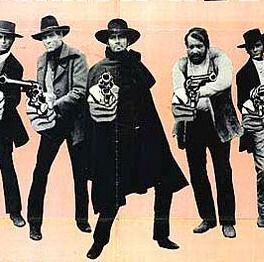TODAY WE KILL, TOMORROW WE DIE!: A Fun Riff On The Spaghetti Western Formula
If you wanted to work in film business in Italy during the 1960's, it was inevitable that you would be involved in the making of at least one spaghetti western. The demand for the genre and the export-friendly nature of these titles ensured that Italian producers would gladly lay down the lira necessary to crank them out with frequency. Thus, a whole generation of commercial-minded Italian filmmakers ended up trying their hand at the genre, including ones that you normally associate with other genres.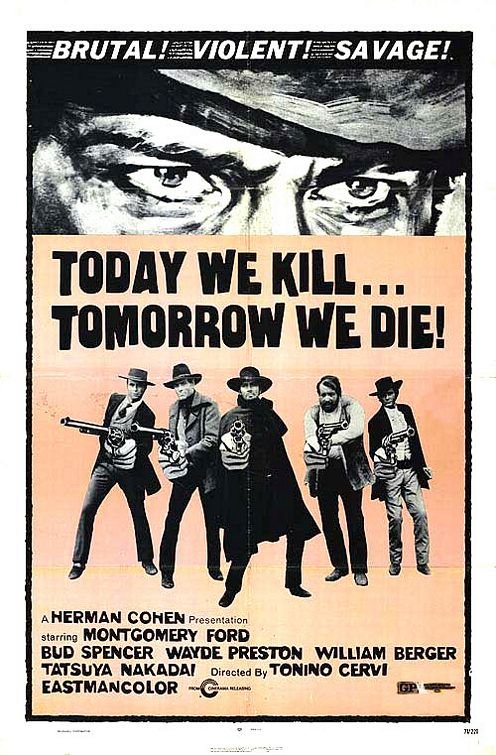 Case in point: Dario Argento. The future Italo-horror wizard contributed to the writing of a few spaghetti western scripts, the best known being Once Upon A Time In The West. Another example is Today We Kill, Tomorrow We Die!, which is more of a straightforward sagebrush programmer. It deals in familiar archetypes but does so in a way with a certain cleverness of touch that suggests the invention Argento would soon bring to the giallo film.The basic plot is as comfortable as an old pair of cowboy boots: it begins with Bill Kiowa (Brett Halsey) emerging from a long jail stint for an unmentioned crime he didn't commit. He's got vengeance on his mind and begins rounding up a colorful gallery of mercenary rogues to aid him in his quest for vengeance, including such spaghetti western stalwarts as William Berger and Bud Spencer. Kiowa's target is the nefarious crime boss Elfego (Tatsuya Nakadai), a treacherously smart sociopath who is as skilled with a machete as he is with a gun.
Case in point: Dario Argento. The future Italo-horror wizard contributed to the writing of a few spaghetti western scripts, the best known being Once Upon A Time In The West. Another example is Today We Kill, Tomorrow We Die!, which is more of a straightforward sagebrush programmer. It deals in familiar archetypes but does so in a way with a certain cleverness of touch that suggests the invention Argento would soon bring to the giallo film.The basic plot is as comfortable as an old pair of cowboy boots: it begins with Bill Kiowa (Brett Halsey) emerging from a long jail stint for an unmentioned crime he didn't commit. He's got vengeance on his mind and begins rounding up a colorful gallery of mercenary rogues to aid him in his quest for vengeance, including such spaghetti western stalwarts as William Berger and Bud Spencer. Kiowa's target is the nefarious crime boss Elfego (Tatsuya Nakadai), a treacherously smart sociopath who is as skilled with a machete as he is with a gun.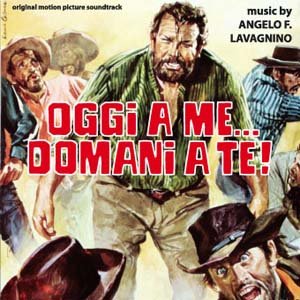 It doesn't take much experience with the genre to predict what follows next: there's an unexpected interruption to the vengeance plan, an extended flashback that explains Kiowa's thirst for vengeance and an extended finale that culminates in a mano-a-mano quick-draw standoff. That said, anyone who enjoys spaghetti westerns won't mind because Today We Kill, Tomorrow We Die! goes through its paces with style, wit and a subtly deployed sense of invention.Throughout the film's running time, Argento and co-writer/director Tonino Cervi keep the vi
It doesn't take much experience with the genre to predict what follows next: there's an unexpected interruption to the vengeance plan, an extended flashback that explains Kiowa's thirst for vengeance and an extended finale that culminates in a mano-a-mano quick-draw standoff. That said, anyone who enjoys spaghetti westerns won't mind because Today We Kill, Tomorrow We Die! goes through its paces with style, wit and a subtly deployed sense of invention.Throughout the film's running time, Argento and co-writer/director Tonino Cervi keep the vi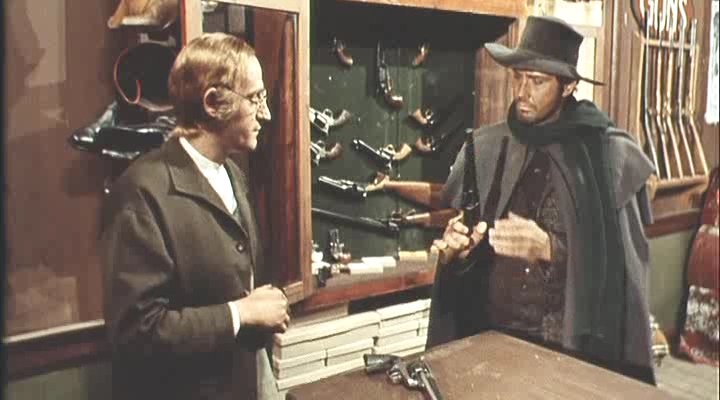 ewer hooked by finding fresh slants of the familiar genre elements. Great examples include the opening, in which Kiowa seems to pull a gun on a guard from his jail cell, only for it to be revealed as a self-carved wooden decoy he uses for drawing practice, and a witty scene where Kiowa forces would-be assassins to wait outside a general store while he takes his time selecting a new pistol to use in their standoff. Touches like these bring a playful, self-referential sense of humor to the proceedings that brightens up the familiar plot variables. Without getting into specifics, it's also worth noting that the extended finale incorporates a unique setting and some unorthodox styles of action beyond gunfighting into its repertoire.
ewer hooked by finding fresh slants of the familiar genre elements. Great examples include the opening, in which Kiowa seems to pull a gun on a guard from his jail cell, only for it to be revealed as a self-carved wooden decoy he uses for drawing practice, and a witty scene where Kiowa forces would-be assassins to wait outside a general store while he takes his time selecting a new pistol to use in their standoff. Touches like these bring a playful, self-referential sense of humor to the proceedings that brightens up the familiar plot variables. Without getting into specifics, it's also worth noting that the extended finale incorporates a unique setting and some unorthodox styles of action beyond gunfighting into its repertoire.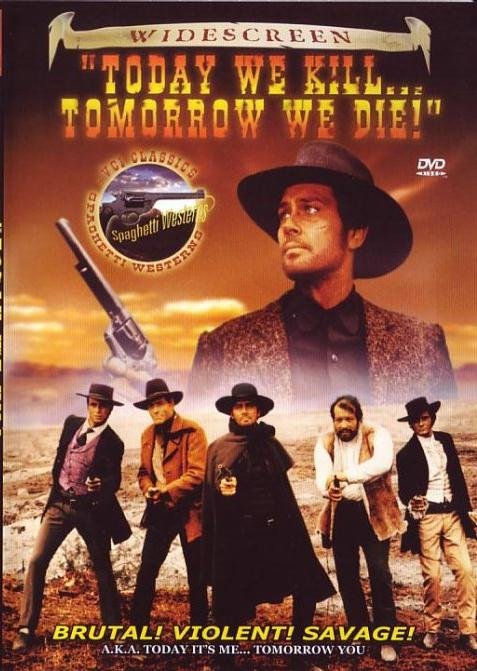 Finally, it helps that Cervi's direction is rock-solid: he keeps the action flowing from start to finish, deploys the different plot elements with style and gives it an appropriately stark yet stylish look. Today We Kill, Tomorrow We Die! also benefits from strong performances across the board: Halsey is convincing as a grimly stoic hero in the Django/Man With No Name vein while Bud Spencer adds a nice touch of deadpan slapstick humor playing a typically brawl-happy character. Nakadai makes an unsettlingly intense villain, infusing his scenes with a kind of furious aggression that makes a distinct impression.In short, Today We Kill, Tomorrow We Die! is the kind of spaghetti western that is tailor made for the genre enthusiasts. It may not reinvent the genre but it handles the familiar tropes with enough invention that fans won't care.
Finally, it helps that Cervi's direction is rock-solid: he keeps the action flowing from start to finish, deploys the different plot elements with style and gives it an appropriately stark yet stylish look. Today We Kill, Tomorrow We Die! also benefits from strong performances across the board: Halsey is convincing as a grimly stoic hero in the Django/Man With No Name vein while Bud Spencer adds a nice touch of deadpan slapstick humor playing a typically brawl-happy character. Nakadai makes an unsettlingly intense villain, infusing his scenes with a kind of furious aggression that makes a distinct impression.In short, Today We Kill, Tomorrow We Die! is the kind of spaghetti western that is tailor made for the genre enthusiasts. It may not reinvent the genre but it handles the familiar tropes with enough invention that fans won't care.


